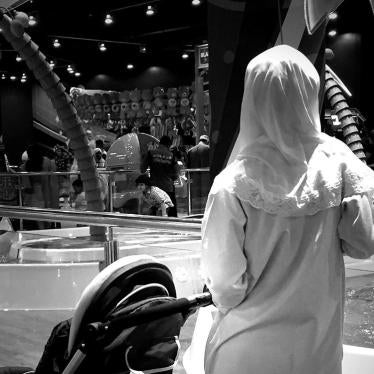We write in advance of the pre-sessional Working Group for the 68th session of the Committee on the Elimination of Discrimination against Women, and its review of Oman’s compliance with the Convention on the Elimination of All Forms of Discrimination against Women (CEDAW). This submission addresses issues related to articles 1, 2, 3, 6, 9, 11, 15, and 16 of the Convention, and recommends questions to put to the Omani government.
- Nationality (CEDAW articles 1, 9, and 11)
The CEDAW committee in its last review of Oman in November 2011 called on the government to “withdraw its reservation to article 9 of the Convention and to amend its domestic laws to grant Omani women equal rights with men in regard to transmission of their nationality to their children who have foreign fathers and to their foreign husbands.”[1]
Oman still does not allow women to transmit nationality to their children on an equal basis with men. Article 18 of the new Omani Nationality Law, promulgated by Royal Decree No. 38/2014, allows an Omani woman to transmit nationality to her children from a marriage to a foreign man only upon becoming widowed, divorced, or when her husband has been absent or abandoned them for at least 10 consecutive years.[2] Moreover, their marriage should have obtained approval from the ministry before it took place, and she should have custody of the child.[3] Omani men can transmit Omani nationality to their children automatically, regardless of whether they are married to an Omani or non-Omani woman.
While both Omani men and women may confer nationality to their foreign spouses, the foreign spouse of an Omani woman is required to have been married and lived in Oman for more than 15 years before he can apply, whereas an Omani man’s foreign spouse is required to have lived in Oman for more than 10 years.[4]
We urge the Committee to request the Omani government for the following information:
- What steps is the Omani government taking to amend Omani Nationality Law No. 38/2014 to stipulate that an Omani citizen is any person born to an Omani father or an Omani mother?
- How many children of Omani women married to foreign men have been granted nationality since the 2014 Omani Nationality Law came into force?
- Personal status laws (CEDAW articles 1, 2, 15 and 16)
The CEDAW Committee, in its concluding observations in 2011, called on Oman to reform its Personal Status Code regarding matters of property, divorce, inheritance, and the requirement of a wali (male guardian)’s permission for a woman to enter into marriage.[5] However, Oman has not done so, and its Personal Status Law still discriminates against women.
Oman’s Personal Status Law requires a woman’s male guardian to contract her into marriage, a condition not imposed on men.[6] Oman has issued Royal Decree No. 55/2010, which permits a woman to appeal to the sharia court chamber in the Supreme Court if her guardian refuses to grant her permission to marry. It also allows a woman to appeal a judgment directly to the Sultan. However, by not repealing the requirement of a male guardian’s permission, the law places a burden on women who wish to marry independently of their guardian’s wishes. The Personal Status Law also requires two Muslim men to act as witnesses to the marriage.[7]
Article 38 of the Personal Status Law recognizes a husband as the head of a household.
A husband can divorce his wife without cause, whereas women who seek divorce must apply to the courts, and only allowed to do so on limited ground. For instance, if their husband has abandoned them or failed to provide financial support.[8] A woman can also obtain a khula divorce, which is a divorce in which she must pay compensation for her husband’s consent to the divorce.[9]
Women are also discriminated against in obtaining guardianship over their children. The law recognizes fathers as the legal guardians of the children, regardless of whether a court has ordered that the children should live with the mother.[10]
In matters of inheritance, women inherit half as much as male heirs.[11] For instance, a husband inherits a fixed share of one half of the estate of his wife if there is no heir, and one quarter of the estate of his wife if there is an heir. However, a wife inherits a fixed share of one quarter of her husband’s estate if there is no heir, and one eighth of the estate if there is an heir.
We urge the Committee to request the Omani government for the following information:
- What measures is the Omani government taking to amend its Personal Status Law to ensure that women have equal rights to enter marriage, during marriage, in obtaining a divorce, in guardianship over their children, and in inheritance?
- Violence against women and girls (CEDAW articles 1, 2, 3, and 16)
Oman has failed to implement the CEDAW Committee’s recommendations on violence against women such as adopting a specific law on violence against women, including domestic violence.[12]
Oman has no legislation to combat domestic violence. Article 37 of the Personal Status Law stipulates that a wife has the right not to be physically or mentally abused by her husband. While the general penal code provisions could apply to physical forms of domestic violence, there is no publicly available information on how many successful prosecutions have taken place using these provisions in cases of domestic violence.[13]
According to a local Omani newspaper, the Ministry of Social Development has opened a shelter for domestic violence survivors.[14] However, it is reported to be limited to Omani women and girls, and expatriate women married to Omani nationals.
Rape is criminalized under article 218 of the Penal Code relating to “indecent assault,” but it is restricted to rape of an unmarried female.[15] It excludes rape of married women, regardless of whether the perpetrator is their husband (marital rape) or not.
Furthermore, non-penetrative forms of sexual assault and sexual harassment are not criminalized in the penal code.
Female genital mutilation (FGM) continues to take place in Oman and has not been explicitly criminalized. A 2014 study conducted for the Stop FGM in Middle East campaign reported that 78 percent of women interviewed said they had been subject to FGM, with the vast majority conducted at home. It also indicated that FGM is still widely practiced, with 64 percent of interviewees stating that their families still practiced FGM.[16]
We urge the Committee to request the Omani government for the following information:
- Describe any government initiatives to compile national studies or statistics on violence against women, including on domestic violence and FGM.
- Please provide data on the number of prosecutions and convictions for gender-based violence in the last five years.
- How many domestic violence survivors have taken refuge in the Ministry of Social Development shelter?
- What steps is the government taking to adopt legislation on violence against women, including domestic violence and FGM?
- What steps is the government taking to amend the penal code to criminalize rape to include married women and marital rape, and to criminalize female genital mutilation, non-penetrative forms of sexual assault, and sexual harassment?
- Migrant domestic workers (CEDAW Articles 1, 2, 6, 11, and 15)
Oman has done very little to conform to CEDAW’s recommendation in its last review to “strengthen the legal protection of foreign workers by adopting policies aimed at preventing abuses; prosecute and sentence the offenders in such crimes, including the recruiters and employers; raise awareness of workers’ rights among all, including migrant and domestic workers, and ensure their access to legal aid and complaint mechanisms and provide necessary assistance and victim protection.”[17]
More than 140,000 female migrant domestic workers, and possibly many more, work in Oman. Most are from the Philippines, Indonesia, India, Bangladesh, Sri Lanka, Nepal, and Ethiopia.
A 2016 Human Rights Watch report, based on interviews with 59 migrant domestic workers, found workers faced multiple forms of abuse and exploitation at the hands of their employers or recruitment agents. Most said that their employers had confiscated their passports, making it harder to leave them if their employers are abusive. Many said their employers did not pay them their full salaries, forced them to work excessively long hours without breaks or days off, or denied them adequate food and living conditions. Some said their employers physically abused them; a few described sexual abuse.[18]
In some cases, workers described abuses that amounted to forced labor or trafficking. They said they applied for jobs in the United Arab Emirates (UAE), but after arriving there, recruitment agents or employers forced or coerced them into crossing the porous border into Oman with employers who exploited and abused them. Employers typically pay fees to recruitment agencies to secure domestic workers’ services, and several workers said that their employers told them they had “bought” them. Some employers demand that workers reimburse them for recruitment fees for their “release.”
Such abuses are facilitated by Oman’s restrictive kafala (sponsorship) immigrant labor system and lack of labor law protections for domestic workers. The kafala system ties migrant domestic workers’ visas to their employers. They cannot work for a new employer without the current employer’s permission, even if they complete their contract or their employer is abusive. Oman’s labor law also explicitly excludes domestic workers, and regulations issued in 2004 on domestic workers provide only basic protection.[19]
Moreover, the 2011 standard employment contract for domestic workers—which mandates one day off per week and thirty days of paid leave every two years--still falls far short of the protections offered by Oman’s labor law.[20]
While Oman prohibits employers from confiscating workers’ passports under a 2006 Ministry of Manpower circular, it is not clear whether Omani law actually allows for criminal sanctions or whether any have ever been imposed.[21] Forced labor is not criminalized in the penal code but under the country’s labor law, which excludes domestic workers.[22] Labor inspectors have no mandate to check on domestic workers, and as such, there are no inspections for working conditions of domestic workers in private homes.
Domestic workers who said they escaped abusive situations have few options. Some said they sought help from recruitment agents, but that the agents confined them to their offices, beat them, and then forced them to work for new families. Some domestic workers who turned to the police for help said officers dismissed their claims out of hand, and returned them to employers or recruitment agencies. In several cases, workers said that employers beat them after the police returned them.
Domestic workers who leave their employer’s homes also risk their employers reporting them as “absconded,” an administrative offense that can result in deportation and a ban on future employment, or even a criminal complaint against them.
Several Omani lawyers and country-of-origin officials said they have no confidence in Oman’s labor dispute settlement procedure or courts for redress for domestic workers. Some embassy officials discourage domestic workers from pursuing such avenues because the process is lengthy and likely to fail, and the workers cannot work in the meantime. Many workers return home unpaid and without justice.
Human Rights Watch documented several cases of women trafficked into forced labor. Interviews with embassy officials suggest that trafficking is taking place regularly. Several country-of-origin embassy officials told Human Rights Watch that many workers were trafficked into Oman via the porous border of the United Arab Emirates. According to an Indonesian embassy official, in April 2015 alone, 60 out of 100 women whom the Indonesian embassy had sheltered had come to Oman by crossing the UAE border, some in trafficking situations.
The number of prosecutions and convictions for trafficking into forced labor is low. Instead, there has been a decrease in prosecutions for trafficking, with only five sex trafficking prosecutions in 2015, none on forced labor, and no convictions. There is no publicly available information on whether any of the prosecutions or convictions relate to trafficking of women into domestic servitude.
We urge the Committee to request the Omani government for the following information:
- What steps is the government taking to include domestic workers into the scope of the Labour Law and update the 2004 regulations on domestic workers to bring them and the Labour Law in line with the ILO Domestic Workers Convention?
- What steps is the government taking to abolish the kafala sponsorship system by amending the Foreign Residency Law and its implementing regulations and other laws so that domestic workers can terminate and transfer employment, at will and without employer consent, including removing “absconding” provisions?
- Please clarify the prohibition on confiscating passports, any related penalties, and how often these penalties have been imposed in the past two years. If confiscating passports is not criminalized, what steps is the government taking to do so?
- What steps is the government taking to criminalize forced labor under the penal code with adequate penalties?
- What steps is the government taking to ratify the ILO Domestic Workers Convention?
- What steps is the government taking to establish government-sponsored shelters for domestic workers fleeing abuse or provide financial support for private shelters?
- What steps is the government taking to train police officers on receiving and processing domestic worker complaints?
- How many cases involving domestic workers subject to trafficking, forced labor, slavery, or slavery-like conditions have resulted in prosecutions or convictions?
[1] CEDAW Committee, Concluding observations: Oman, Fiftieth session 3 – 21 October 2011, UN Doc. CEDAW/C/OMN/CO/1, November 4, 2011, para. 33-34, http://tbinternet.ohchr.org/_layouts/treatybodyexternal/Download.aspx?symbolno=CEDAW%2fC%2fOMN%2fCO%2f1&Lang=en (accessed January 21, 2017).
[2] Omani Nationality Law, promulgated by Royal Decree No. 38/2014, article 18, http://gulfmigration.eu/oman-sultans-decree-no-38-of-2014-issuing-the-omani-citizenship-law-2/ (accessed January 23, 2017).
[3] Omani Nationality Law, art. 18 also provides that the child should also have resided in Oman for at least 10 continuous years, possess sound conduct and character; shall not have been convicted of any crime or offence in breach of trust, unless rehabilitated; and the minor’s guardian, if any, shall express in writing his non-objection of the child acquiring Omani citizenship.
[4] Omani Nationality Law, arts. 15-16. Note other stringent conditions apply to both the foreign husband and the foreign wife.
[5] CEDAW Committee, Concluding observations: Oman, Fiftieth session 3 – 21 October 2011, UN Doc. CEDAW/C/OMN/CO/1, November 4, 2011, para. 45.
[6] Personal Status Law, Royal Decree No. 32 of 1997, arts.19-20.
[7] Personal Status Law, art. 28.
[8] Personal Status Law (No. 32 of 1997), arts. 98–114.
[9] Personal Status Law (No. 32 of 1997), art. 95.
[10] Personal Status Law (No. 32 of 1997), arts. 158-169.
[11] Personal Status Law (No. 32 of 1997), arts. 243, 244, 245, 246 and 254.
[12] CEDAW Committee, Concluding observations: Oman, Fiftieth session 3 – 21 October 2011, UN Doc. CEDAW/C/OMN/CO/1, November 4, 2011, paras. 27-28.
[13] Penal Code, promulgated by Royal Decree No. 7/74, arts. 247-249.
[14] “Shelter from the storm of abuse for women in Oman,” Times of Oman, January 7, 2015, http://timesofoman.com/article/45953/Oman/Shelter-from-the-storm-of-abuse-for-women-in-Oman (accessed January 23, 2017).
[15] Penal Code, promulgated by Royal Decree No. 7/74, article 218 states: “Any person who has intercourse with an unmarried female without her consent through coercion, threat or subterfuge, or who abducts a person using the same means with the intent of committing fornication, or who commits fornication with a person under the age of 15 or with a person who has a physical or mental deficiency, shall be punished by imprisonment of 5 to 15 years, even if the act occurs without coercion, threat or subterfuge or if the perpetrator is a parent or guardian of the victim, or has power over the victim, or is an attendant of the victim.”
[16] “Female Genital Mutilation in the Sultanate of Oman,” January 2014, http://www.stopfgmmideast.org/wp-content/uploads/2014/01/habiba-al-hinai-female-genital-mutilation-in-the-sultanate-of-oman1.pdf (accessed January 24, 2017.) See also “The Deepest Cut,” Y – the Pulse of Oman, February 5, 2014, https://www.y-oman.com/2014/02/deepest-cut/ (accessed January 23, 2017).
[17] CEDAW Committee, Concluding observations: Oman, Fiftieth session 3 – 21 October 2011, UN Doc. CEDAW/C/OMN/CO/1, November 4, 2011, para. 43.
[18] See Human Rights Watch, “I Was Sold”: Abuse and Exploitation of Migrant Domestic Workers in Oman, July 2016, https://www.hrw.org/report/2016/07/13/i-was-sold/abuse-and-exploitation-migrant-domestic-workers-oman.
[19] Labour Law, issued by Royal Decree no.35/2003, 2012, art. 2(3), https://www.manpower.gov.om/Portal/Englishpdf/Service/toc_en.pdf (accessed June 21, 2016), and Ministerial Decision no. 189/2004 on labor rules and conditions for domestic employees, issued on June 16, 2004, available in Arabic at http://www.omanlegal.net/vb/showthread.php?t=14362 (accessed January 23, 2017), and http://www.s-oman.net/avb/showthread.php?t=701180 (accessed January 23, 2017).
[20] Ministry of Manpower Decision no. 1/2011 Organizing manpower of non-Omanis, “Employment Contract for Domestic Workers and Similar Jobs,” http://www.omanlegal.org/law/omanlegal/2011-1-1-1.pdf (accessed January 23, 2017), p. 13.
[21] The 2006 circular provides no penalties for noncompliance. Human Rights Watch could not find this circular on a government website. The text of the Ministry of Manpower Circular no. 2/2006 of 2006 (in Arabic) is reproduced on this website: http://avb.s-oman.net/archive/index.php/t-1285676.html (accessed January 23, 2017).
[22] Royal Decree no. 74/2006 amending some provisions of the Labour Law, adds art. 3(bis) under chapter 2 of the Labour Law: “The employer is prohibited to impose any form of compulsory or coercive work,” and art. 123: “Failure to observe article 3(bis) will result in imprisonment of a maximum of one month and/or a fine of 500 OMR. The penalty will be doubled in case of recurrence.” See text of decree (in Arabic) on Oman Legal website, http://omanlegal.org/law/Resault.aspx?law_file=74-2006.pdf (accessed January 23, 2017), and Oman’s labor law at Ministry of Manpower website, https://www.manpower.gov.om/Portal/Laborlaw.aspx (accessed January 23, 2017).







